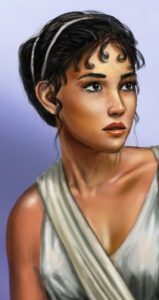Homer’s Women
 Comment was made in the course of our discussion of the Iliad, of the great cultural differences in the late-bronze age status of women, and that of our own time, three millennia in the future.
Comment was made in the course of our discussion of the Iliad, of the great cultural differences in the late-bronze age status of women, and that of our own time, three millennia in the future.
Consider the character of Briseis, taken and given as a spoil of war to Achilles consequent to the razing of the Trojan city of Lyrnessus. Briseis is the focal point of the contest of honor between King Agamemnon and Achilles, the Achaeans indispensable warrior.
She does not emerge as an entirely helpless victim in Homers lines. According to the king’s command, Patroclus hands her over to Agamemnon’s heralds:
He led out the beautiful girl, and he handed her over
to the two men. And they walked back beside the ships,
and Briseis walked with a heavy heart. 1.350-52
Keep in mind that Achilles has killed her husband and her three brothers when he conquered Lyrnessus. She was reluctant to leave him. In his own remarks Achilles calls her “my wife, my darling.” “I loved this woman, with all my heart,/even though she was a captive, won by the spear.”
What was in it for Briseis?
- Achilles is tall and handsome
- He is three times more powerful than the ordinary warrior.
- He us the best and the bravest of the Achaeans.
- He is supremely confident.
- He speaks with fierce eloquence.
- He is a loyal friend.
- He is a good son.
2 thoughts on “Homer’s Women”
Where are you finding any independent agency for Briseis? A gender-reversing thought experiment probably will not quite work here for male readers, yet give it your best shot anyway:
If someone had barged into town, slaughtering your spouse and siblings, and physically had claimed you and your lifetime services as a war prize, could you nonetheless find a way to be kindly disposed toward your captor?
And as you consider that question, how much would your answer depend on the person’s good looks, status, bravery, confidence, eloquence or declarations of attraction to you?
Why should loyalty and family devotion be praised as virtues in Achilles, yet not in Briseis, who was expected blithely to relinquish her former loyalties in submission to her captor?
These days a person willing to be someone’s possession is not seen as a fully functioning adult human.
Is there, has there ever been independent agency for anyone, ever? Every society is a network of power relationships. Certainly the oldest and still most prevalent are male dominated societies.
The late bronze age was surely a very difficult time to be alive by today’s American standards. Your prospects came down to the accident of your birth into a particular strata. If you were female, that was the card you were dealt with very little “play” in your given life, cradle to grave. Lots of water has flowed over the damn until now, and for many who live in the “first world” there is more opportunity it seems, for self-creation.
But then again, I am certain that I know nothing about what it was like to live around 1300 BCE.
Your thought experiment is helpful. However for millennia slavery was accepted as the norm in many places. I am pretty sure that slavery in the ancient world was very different than the chattel slavery on an antebellum Southern cotton plantation.